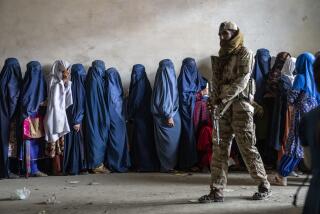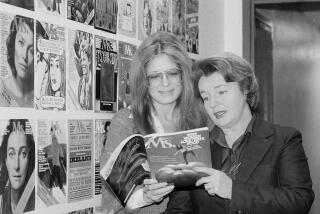Gearing Up for End of U.N. Decade for Women
- Share via
This year marks the end of a decade. Launched with a conference in Mexico City in 1975, the “United Nations Decade for Women: Equality, Development and Peace” will officially terminate in July with an “end-decade” conference in Nairobi attended by government-appointed delegations from 159 member nations.
Short of a miraculous series of events between now and July, the decade will end falling far short of its goals. It will end even falling far short of the 14 “minimum objectives to be achieved by 1980” set forth in the World Plan of Action adopted in Mexico City. Those goals had to do with literacy, access to education, training and employment, voting and political rights, promotion of women to policy-making positions, health, sanitation, nutrition and other social services. Not only have those goals not been realized, but in some instances women can be said to be farther behind than they were in 1975.
And more divided. The conference in Mexico City and the mid-decade conference in Copenhagen were much politicized events, both at the official gatherings and the unofficial (but many agree more significant) forums of non-governmental organizations. Cultural, racial, political, ideological differences were obstacles that sisterhood did not always override. Putting it most positively, Gracia Molina de Pik of San Diego, who attended the Mexico City forum, said of it recently, “We had a good fight.”
Women in the Los Angeles area have been discussing the situation in earnest recently, assessing the decade and looking toward Nairobi. Two “pre-Nairobi” conferences have drawn hundreds of women from a variety of backgrounds and organizations to share their concerns and discuss what impact they might have on the official conference, to which Maureen Reagan (the President’s daughter and a women’s rights activist) will lead the White-House appointed United States delegation, and the forum, also in Nairobi.
Last Sunday, “The Road to Nairobi,” coordinated by Kagey Kash, past international president of B’nai B’rith Women, was convened at the Airport Marriott by B’nai B’rith Women, the Anti-Defamation League of B’nai B’rith and the Women’s Conference of Jewish Federation Council, with about 40 women’s organizations co-sponsoring.
More than 300 women came to hear Maureen Reagan report on a planning meeting for heads of delegations that she had attended recently in Vienna and to tell women what they realistically could expect to come out of Nairobi. Phyllis Kaminsky, director of the United Nations Information Office in Washington, presented an overview of the decade, and speakers and participants discussed the politics and networking of the decade.
“Relating the World Plan of Action to Los Angeles” was the theme of an earlier conference held at USC last month, sponsored by a coalition of women’s organizations (many of them also represented at the Marriott gathering) with the help of the U.N. Non-Governmental Liaison Service.
There, Hilda Paqui, a Ugandan woman who is an information adviser at the United Nations Development Program in New York, discussed both women’s progress and the lack of it over the decade, and talked of the need for some “forward-looking strategies.” Local women recounted their experiences in Mexico City and Copenhagen and raised issues, ranging from wife battering to pornography to irrigation to apartheid that they wanted to see discussed in Nairobi.
The focus varied at both conferences. Last Sunday’s session concentrated more on the internal dynamics of the conferences, while the USC gathering concentrated more on the status of women. Neither focus provided much cause for jubilation.
Divisived Politics
At the Marriott last Sunday many women deplored what they called the “anti-Western, anti-Zionist, anti-Jewish” sentiments that prevailed in Mexico City and Copenhagen. They said women’s issues were co-opted at those events by political divisiveness. Betty Shapiro of B’nai B’rith, who attended forums both in 1975 and 1980 called Copenhagen traumatic and said that there were times when she was in physical fear.
“The women in Mexico City permitted the rape and ruin of their conference,” Phyllis Kaminsky said at the Marriott. “They were unwittingly seduced into having the seeds on anti-Semitism planted in them,” explaining that “infamous resolution” equating Zionism with racism that was adopted by the U. N. General Assembly late in 1975 had its inception in Mexico City.
“The extreme politicization at Copenhagen resulted in the assessment of women’s progress in the decade being derailed,” she said.
At USC, Hilda Paqui started out detailing some progress: a number of governments have created bureaus for women’s rights, have appointed women to decision-making posts. At the international level, a women’s component is a must for any program seeking funding, a Voluntary Fund for the decade has been established, there is an International Women’s Tribune Center.
“One might wonder why the situation is so bad, sometimes worse than it was 10 years ago,” Paqui said, sadly reciting a familiar litany: Illiteracy is rising and two out of three illiterates are women; the world’s growing refugee population is 90% female; more than one-third of the world’s households are headed by women. . . .
“There is,” Paqui said, “a basic lack of political will and commitment on the part of governments (to change the situation). And there are deeply entrenched social and cultural biases against women.”
She urged the women not to “get hung up on” trying to influence the official conference, which many have criticized for the entrenched governmental attitudes it has reflected in the past and its male domination, in some cases open, in others behind the scenes.
On Positive Notes
“The NGO forum (where women from independent organizations come together and set their own agenda) is where the real action takes place,” Paqui said, and then laughed, “I hope I don’t get excommunicated by the U.N.”
For all the grim news and past pain, neither conference was marked by negativism or an attitude of “Why bother?” At least by the close of both sessions there seemed to be urgency to get on with Nairobi, even though a small percentage of those present would personally be attending.
When the Overseas Education Fund’s Loretta DiPeri started the day’s proceedings at USC by greeting the women in Swahili with “Djambo, karibuni” (Hello, welcome), saying she wanted to set the mood for Nairobi, she did just that. For a moment there was a rustle of anticipation and delight.
It was much the same effect that Maureen Reagan had at the Marriott when she ended her flatly realistic presentation on a bound-to-succeed, “there ain’t nothin’ we can’t do” note, and left the podium with a cheerful wave calling out, “Well, onward to Nairobi, gang.”
The women at the Marriott had been approaching the subject of Nairobi with the attitude that because the conference was supposed to be confined to certain issues relating to women, if they could somehow come up with the right strategy they could hold the conference and the forum to their respective agendas.
Reagan dissuaded them of that belief, saying, “We are taking no false expectations. Political issues are going to be discussed whether we want them to be or not . . . . If we try to influence international policy, it’s not going to work.”
She had dropped her sarcastic tone, and seemed to be speaking from the heart with much conviction, describing the freedom and mobility of American women, when she said, “Let’s live up to our sophistication. We have something going for us that nobody else has. We’ll be there meeting people, making connections, making friends in so many countries.”
Later she said, those personal connections would be used here to influence American foreign policy and aid: “We can say, ‘We’ve talked to some of those women firsthand and we know something about their priorities.’ ”
At both conferences, women seemed in accord about one central issue. If they did not know it in 1975, they know now that much of American feminist concerns are not translatable to Third World women, in fact are inappropriate.
Betty Shapiro told last Sunday’s gathering that all women have something in common, and that is the fact they are exploited, oppressed and subjugated.
At USC, Sandra Serano Sewell, of Comision Feminil Mexicana National, said that “to talk feminism to a woman who has no food, no water, no home is to talk nonsense.”
Later that day, Jane Jacquette, a political scientist from Occidental College, defined the mission for the women at the USC gathering: “United States feminists have to go to Nairobi not with a feminist agenda but a redistribution agenda. That’s the only way international feminism can succeed.” At the Marriott, Carmela Lacayo, chairperson of the Forum of Hispanic Organizations, urged that American women understand just where some of that anti-Western sentiment came from, saying that in too many cases America’s foreign policy had not been that of a good neighbor.
Nor, she admonished, should American women approach the world with inflated notions of their own superior status as women.
“Where has this country come to regarding those issues?” Lacayo said they should ask themselves. “I’ve seen an increase in the feminization of poverty, the defeat of the equal rights amendment, older women increasingly become the lowest on the poverty scale, equality of access to health and education continue to decline . . . . Let’s do it here. Then we can go and say, ‘We did it at home. Join us.’ ”
More to Read
Sign up for Essential California
The most important California stories and recommendations in your inbox every morning.
You may occasionally receive promotional content from the Los Angeles Times.













